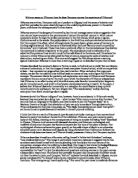How Does Tennyson create Character in "Ulysses" and "Tithonus"?
How does Tennyson create character in ‘Ulysses’ and ‘Tithonus’?
‘Ulysses’ is a dramatic monologue shown by first person narration spoken by Ulysses, the King of Ithaca. Caught up in the routine of everyday life, he is miserable and yearns to go back to his days of adventure. He is indifferent towards his people and refers to them as ‘savage race’ – as far as he’s concerned, they haven’t evolved into normal people and are below him. His desire to escape from his role as an ‘idle King’ can be interpreted to show his selfishness because he wishes to up and leave. He claims that his people ‘know not me’, showing that he feels unappreciated and he exclaims ‘I am become a name’ – he thinks he is famous. Tennyson creates character in ‘Ulysses’ by giving him two sides – a heroic side and a self-absorbed, cowardly side. His desire to flee from his responsibility, family and people can be seen as selfish, as this would mean he is leaving his inexperienced son Telemachus to take his place. But it can also be seen as admirable, as he yearns to go life-threatening adventures and do things that others dare not.
The language that Tennyson uses to create character in ‘Ulysses’ is egocentric, emotive and philosophical. ‘Myself not least, not honour’d of them all’ shows Ulysses egocentric nature. He claims that his people ‘sleep, and feed and know not me’ making his new found life sound monotonous and mundane in comparison to ‘that unravell’d world’ that he yearns to explore. The eating and drinking metaphors such as 'hungry heart' and 'drunk delight' symbolises the idea of fulfillment and Ulysses insatiable appetite for life and adventure. The intensifiers such as 'greatly' and 'much' emphasise this. The images of voyaging on the sea denote freedom and reiterate the fact that Ulysses is ‘hungry’ for a more fulfilling life. ‘you and I are old’ – towards the close of the poem Ulysses has a sudden sense of realization that he is not as young as he used to be and has been ‘made weak by time and fate’ but he accepts the fact that he is ageing. Tennyson uses personification to symbolise the end of the day; ‘the long day wanes: the slow moon climbs’ but this could also be symbolic of the end of life and the knowledge that Ulysses has that perhaps his day is almost up.










